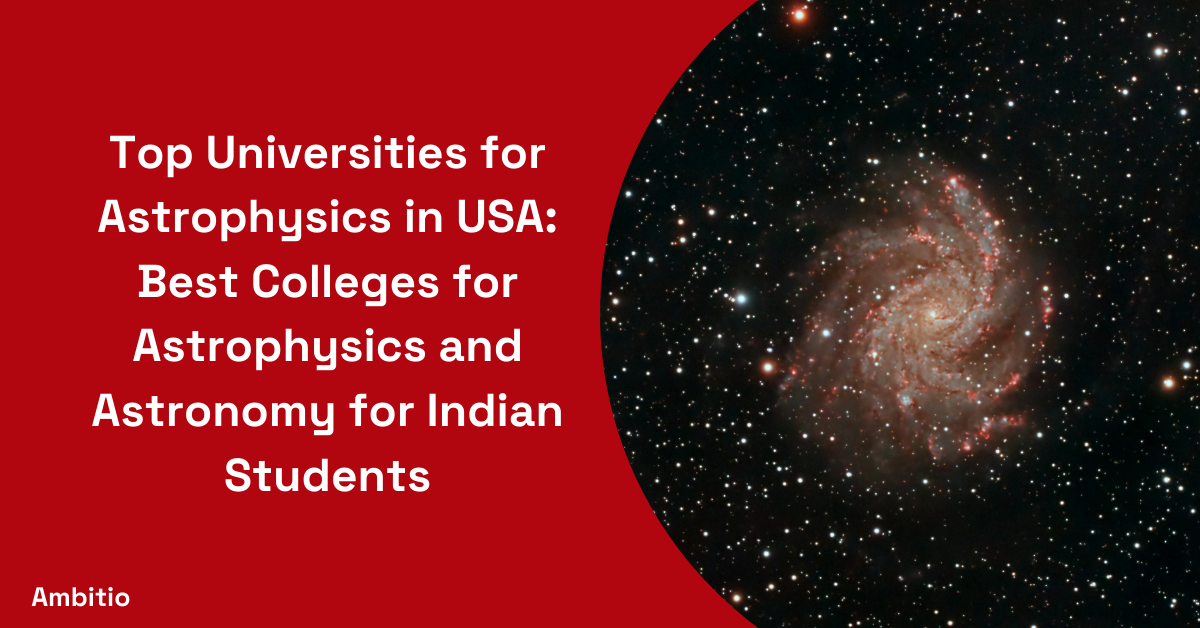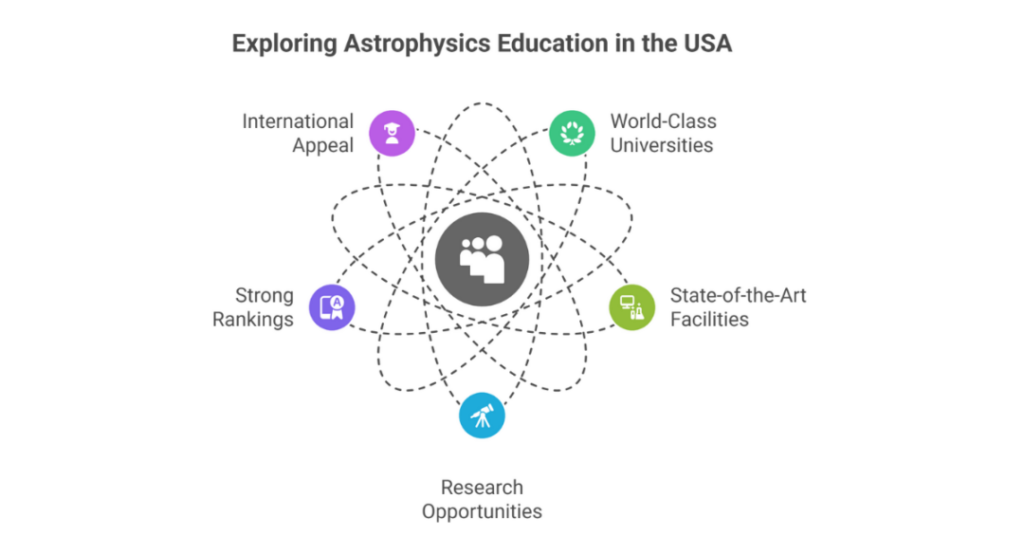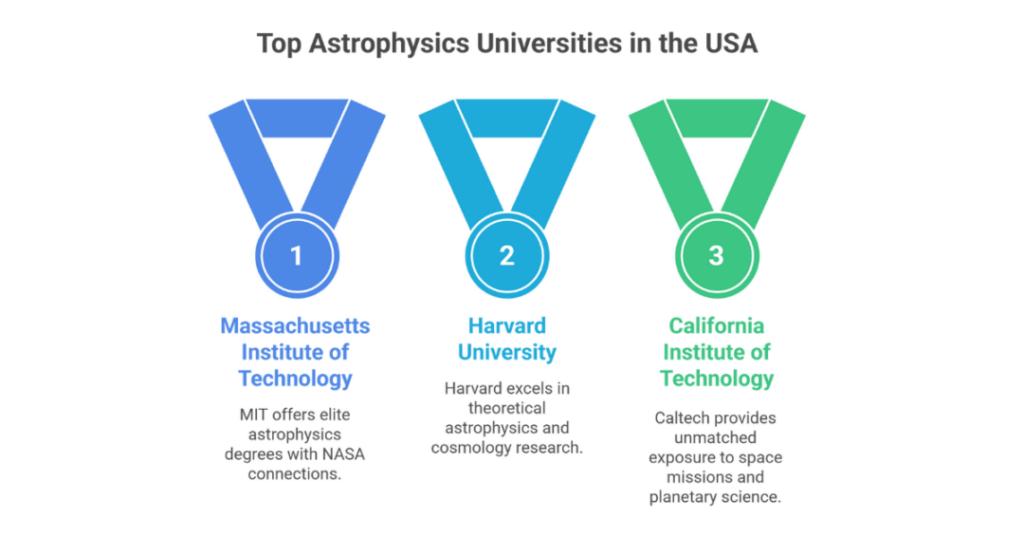12 July 2025
4 minutes read
Top Universities for Astrophysics in USA: Best Colleges for Astrophysics and Astronomy for Indian Students

Key Takeaways
- Top universities for astrophysics in USA provide unmatched research facilities, world-renowned faculty, and hands-on experience in space science.
- It consistently ranks high in global physics and astronomy listings, including the QS World University Rankings 2024.
- Top universities for astrophysics in USA offer diverse programs in both observational and theoretical astrophysics for undergraduate and graduate students.
Astrophysics is one of the most intriguing areas of science. It takes the secrets of the space and the laws of physics together to look for answers about the universe beyond our grasp. The USA continues to be a top place to study astrophysics, with world-class programs, high rankings, and thrilling research opportunities in both astronomy and astrophysics. In this article, we bring to light the 10 top colleges for astrophysics in the USA, according to the QS World University Rankings 2024 and other top sources.
Why Study Astronomy and Astrophysics in the Best Universities in USA?
The USA has numerous world-class universities offering astrophysics and astronomy degrees. The schools offer exposure to state-of-the-art laboratories, telescopes, and theoretical and observational research. With strong physics and astronomy rankings, the USA is visited by thousands of students willing to learn astrophysics in the USA.

Fun fact: The United States operates more major telescopes than any other nation, including some located in space!
10 Best Universities for Astrophysics in the USA
If you’re considering a degree course in space science, this top university list details how each astronomy department provides excellent opportunities to study physics, with some of the most extensive astronomy offers and dedicated degree courses in the top US colleges—such as Washington University in St. Louis, widely believed to be one of the top colleges providing top-level courses in USA.

Let us look at the best colleges in the US offering Astrophysics in the USA:
1. Massachusetts Institute of Technology (MIT)
Located in Cambridge, MA, MIT offers an elite astrophysics degree through its Department of Physics. With research facilities like the Kavli Institute and connections to NASA, MIT ranks highly in world college rankings by subject.
2. Harvard University
Harvard University is a top choice for students interested in theoretical astrophysics and cosmology. The university partners with the Smithsonian in its Center for Astrophysics, providing vast opportunities for observational astronomy.
3. California Institute of Technology (Caltech)
Caltech is a powerhouse for space science and astronomy. Home to the Jet Propulsion Laboratory, Caltech provides unmatched exposure to planetary science and space missions.
4. Stanford University
Stanford’s physics and astronomy programs offer a blend of theoretical and observational research. It ranks among the best universities in the USA for astrophysics and cosmology.
5. Princeton University
Princeton’s Department of Astrophysical Sciences is internationally respected. The school supports both graduate programs and undergraduate research in astrophysics and astronomy.
6. University of California, Berkeley
UC Berkeley stands out for its leading research in black holes, cosmology, and space physics. The university’s astrophysics program is supported by facilities like the Lawrence Berkeley National Lab.
7. University of Chicago
The University of Chicago houses a historic Department of Astronomy and Astrophysics. Known for its work in space physics and cosmology, it offers world-class graduate programs.
8. Yale University
Yale provides both undergraduate and graduate programs in astrophysics and astronomy. Its facilities support observational and theoretical research in planetary science and stellar dynamics.
9. Cornell University
Cornell has a strong reputation in planetary science and observational astronomy. Its Arecibo legacy and cutting-edge labs make it one of the best colleges for astrophysics.
10. University of Colorado Boulder
This university offers programs in astrophysics with a focus on space weather and atmospheric science. It ranks highly in the world college rankings for physics and astronomy.
Other notable colleges for astrophysics and astronomy in the United States include the University of Maryland, the University of Arizona, the University of Illinois, Rice University, the University of Virginia, Ohio State University, Pennsylvania State University, Columbia University, the University of Florida, Carnegie Mellon University, Boston University, Brown University, Emory University, Washington State University, the University of Delaware, the University of Cincinnati, and Mason University.
Admissions and Standardized Tests
To study astrophysics in the USA, international students generally require high academic performance and standardized test scores.
Undergraduate: SAT or ACT, TOEFL or IELTS
Graduate: GRE, Physics GRE (for some programs), TOEFL or IELTS
MBA/Related: GMAT (for interdisciplinary paths)
Conclusion
From black holes to planetary systems, the USA offers a broad range of opportunities for astrophysics students. These top universities for astrophysics not only rank highly in the QS World University Rankings 2024 but also lead in research, teaching, and innovation. So if you’re ready to explore the cosmos, find out which universities are the best fit for your journey into the stars.
Take your journey beyond the stars with Ambitio, your ideal study abroad partner. Schedule a call with our experts now and make your dreams come true!
FAQs
What are the top universities for astrophysics in USA known for?
The top universities for astrophysics in USA are known for cutting-edge research in cosmology, black holes, and space physics, along with access to world-class observatories and labs.
How can international students apply to the top universities for astrophysics in USA?
To apply to the top universities for astrophysics in USA, international students must meet academic requirements and submit standardized test scores like SAT, GRE, TOEFL, or IELTS, depending on the program.
Do the top universities for astrophysics in USA offer undergraduate programs?
Yes, the top universities for astrophysics in USA offer rigorous undergraduate programs that combine physics, astronomy, and mathematics with early exposure to research.
Are scholarships available at the top universities for astrophysics in USA?
Many of the top universities for astrophysics in USA offer need-based and merit-based scholarships for both domestic and international students pursuing degrees in astronomy and astrophysics.
What are some career paths after graduating from the top universities for astrophysics in USA?
Graduates from the top universities for astrophysics in USA often pursue careers in academia, space agencies like NASA, observatories, or data science roles in tech industries.
How are the research opportunities at the top universities for astrophysics in USA?
The top universities for astrophysics in USA provide abundant research opportunities in observational and theoretical astrophysics, often in collaboration with national labs and space missions.
Why are the top universities for astrophysics in USA highly ranked globally?
The top universities for astrophysics in USA achieve high global rankings due to their academic excellence, influential faculty, strong publication output, and advanced technological infrastructure.

You can study at top universities worldwide!
Get expert tips and tricks to get into top universities with a free expert session.
Book Your Free 30-Minute Session Now! Book a call now




























